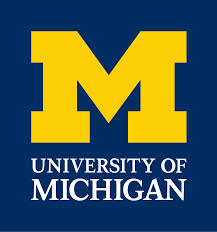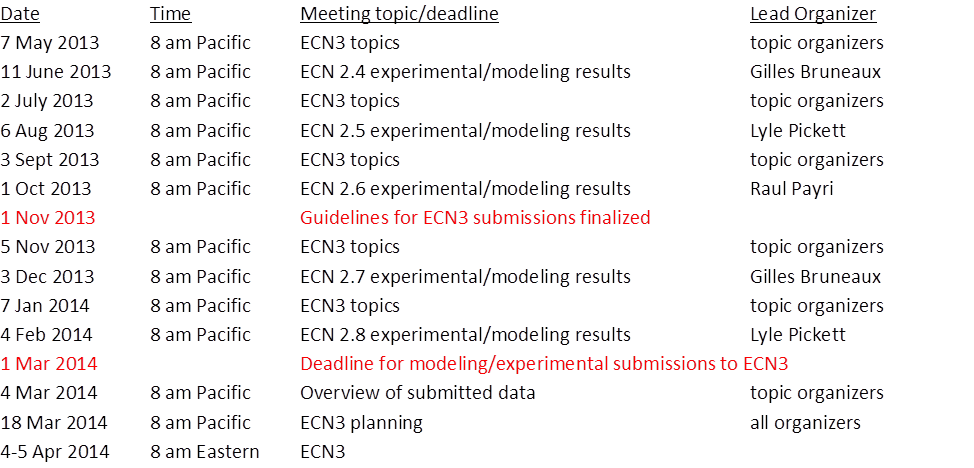Engine Combustion Network 3rd Workshop

Hosted by the University of Michigan ME Department
Ann Arbor, Michigan, 4-5 April 2014, before SAE 2014
Announcing
We are pleased to announce that the 3rd workshop for the Engine Combustion Network will be held at the University of Michigan shortly before the 2014 SAE World Congress. The goal of the ECN is to promote the development of predictive engine combustion modeling for the design of more fuel-efficient, low-emission engines. The ECN provides highly leveraged, vetted datasets for spray combustion model development by utilizing contributions from many experimental and modeling participants at pre-selected operating conditions appropriate to engines. Workshops are held to coordinate this research. Organizers gather experimental and modeling results prior to the workshop to allow a side-by-side comparison and expert review of the current state of the art for diagnostics and engine modeling, and to identify needed future directions. Please see specific guidelines for experimental and modeling participation.
Registration
Registration to attend the meeting in person is now full but the meeting will be webcast live to those that could not attend. Please register now to attend the webex broadcast without charge.
Cost: $150 (no banquet) or $200 (with banquet). Registration includes payment for breaks, lunches, options for a Friday night banquet near the venue.
Location
The meeting will be held at the Rackham Graduate School Amphitheater:
Rackham Building (4th floor)
915 E. Washington St.
Ann Arbor MI 48109
Hotel, restaurant, and transportation options.
Useful maps of the venue:
from airport,
U. Michigan campus,
Rackham, MI League (banquet), and parking,
Lay auto lab.
Information concerning accommodations. A list of the different hotels and lodging establishments is given, as well as the location and distance with respect to the conference room and engine lab.
Parking at the Maynard St city lot or on-campus Palmer Structure (180 visitor spots) is approximately $1.20 per hour.
The Friday banquet and Saturday evening reception and games will be held near Rackham at the Michigan League 2nd floor.
Although we intended to offer a tour of the E. Lay Automotive Lab on North Campus, the additional time required to bus to and from the laboratory and to accommodate a large group and a full technical program made the tour not feasible and it is therefore canceled. However, University of Michigan staff have offered to show their facilities as time permits before or after the workshop. Anyone interested in visiting a particular University of Michigan Laboratory should email the relevant UM Laboratory Staff by March 31.
ECN3 Objectives and Program (start at 8 am Friday) Schedule/program
The topical areas chosen for ECN3 will build upon recommendations from past workshops and current research pathways. The organization for ECN3 seeks to understand and connect what may seem as disparate phenomenon—for example, effects originating within the nozzle that affect combustion downstream. Four major topics are listed below, along with several example themes for these topics:
ECN3 Participation
Specific guidelines for experimental and modeling participation are available. Experiments and simulations will be performed based on these guidelines. Workshop organizers will collect and synthesize results before ECN3. Please let us know if you will make a contribution to one of these topical areas and if you are willing to serve in one of topical area committees (1-4).
ECN3 Calendar
We will have ECN web meetings on the first Tuesday of every month, leading up to ECN3. Meetings will alternate between “ECN3 topic organization” and “experimental/modeling results” every other month. Topic organizers will lead the discussion on those months. Time will be allotted to each topic in series. Participants can stay in attendance or drop in/out as needed. Topic organizers will coordinate the guidelines for experimental and modeling submissions, and make arrangements to collect these submissions for analysis. The deadline for all experimental and modeling submissions will be approximately 1 month before ECN3, and any earlier submission is encouraged. Lead time is needed to resolve questions about the data, ensure uniformity and standardization, and provide time for analysis BEFORE ECN3.

